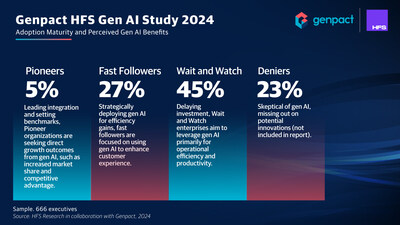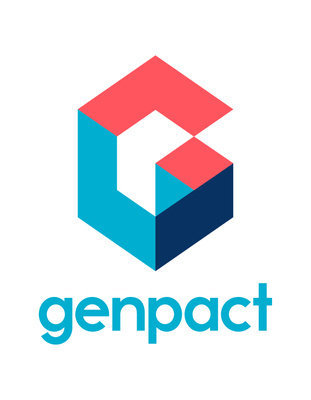Enterprises Have Just Two Years to Harness the Full Potential of Generative AI, New Report from Genpact and HFS Research Finds
A new report by Genpact and HFS Research reveals that enterprises have a two-year window to leverage the full potential of generative AI (gen AI) before falling behind competitors. The study shows that only 5% of enterprises have mature gen AI initiatives while 61% allocate up to 10% of their tech budgets to gen AI. Despite 74% of executives expecting productivity gains, 52% warn against focusing solely on productivity, emphasizing broader business goals. Companies in health care, retail, and high-tech are leading in gen AI investments, reallocating funds towards these initiatives. The report also stresses the importance of data quality and calls for a shift to performance-driven commercial models to fully capitalize on gen AI's benefits.
- Genpact and HFS report reveals a two-year window to capitalize on gen AI before losing competitive edge.
- 5% of enterprises achieve mature gen AI initiatives, indicating significant room for growth.
- 61% of executives allocate up to 10% of tech budgets to gen AI, highlighting its pivotal role.
- 74% of executives expect gen AI to drive productivity gains.
- Health care, retail, and high-tech industries are leading in gen AI investments.
- Organizations are urged to align AI strategies with growth and market-oriented gains.
- Only 5% of enterprises have mature gen AI initiatives, suggesting slow adoption.
- 52% of executives caution against overemphasis on productivity, fearing it may impact broader business goals.
- Challenges in data quality and strategy could hinder gen AI success.
- Current time and material driven engagement models are becoming ineffective, requiring shifts to performance-driven models.
- 23% of enterprises are skeptical of gen AI, missing out on potential innovations.
- The two-year window creates a pressing timeline for enterprises to act swiftly.
Insights
Genpact's report underscores the significant investment trends in generative AI (gen AI), emphasizing the sector's potential to drive value creation. Data shows that 61% of enterprises are allocating up to 10% of their tech budgets to gen AI. This substantial allocation indicates a strong belief in gen AI’s potential ROI. However, with only 5% of enterprises having mature gen AI initiatives, there is a considerable gap between investment and operational maturity.
The reallocation of 51% of executives' budgets from existing IT infrastructure and software development towards gen AI highlights a strategic shift, where efficiency gains and automation potential are key drivers. This trend is especially prominent in sectors like health care, retail and high-tech, demonstrating diverse industry confidence in gen AI's capabilities.
From a retail investor’s perspective, it's essential to recognize this trend as a signal of where tech budgets will be directed, potentially affecting
Generative AI's capability to transform various business processes is profound. The emphasis on leveraging gen AI for customer satisfaction, revenue growth and competitive advantage as indicated by 74% of executives highlights its multifaceted benefits beyond mere productivity. This technology can automate content creation, personalize customer interactions and even drive new business models.
However, the report also cautions against focusing solely on productivity gains, with 52% of respondents warning about the potential negative impacts on employee experience. This hints at the necessity for a balanced approach where gen AI contributes to holistic business growth without undermining workplace dynamics.
Understanding the data quality imperatives is crucial. The success of gen AI initiatives is heavily reliant on high-quality, well-structured data. Companies need robust data management strategies and investments in data infrastructure to ensure that AI models yield accurate and actionable insights.
For retail investors, this implies that companies with advanced data management capabilities are better positioned to harness gen AI’s full potential, likely leading to better
The joint report by Genpact and HFS Research indicates that the next two years are critical for enterprises to leverage generative AI effectively. The report categorizes enterprises into four gen AI maturity levels: Pioneers, Fast Followers, Wait and Watch and Deniers. This segmentation reveals not only the current state of adoption but also the varying strategic priorities among companies.
Pioneers and Fast Followers are more likely to gain market share and competitive advantage by leveraging gen AI to its fullest potential. On the other hand, Wait and Watch enterprises might initially benefit from operational efficiency and productivity but could lag in market-oriented gains. Deniers, who are skeptical, risk missing out on significant innovations that could affect long-term competitiveness.
For retail investors, identifying companies that fall into the Pioneer or Fast Follower categories can be advantageous. These companies are not only investing heavily in gen AI but also aligning their strategies toward comprehensive growth and market gains. It’s also vital to watch how these companies shift their engagement models to capitalize on AI-driven opportunities.
Overall, the market’s enthusiasm reflects a transformative phase where early adopters of gen AI are likely to emerge as industry leaders, offering substantial investment opportunities. Yet, the risks associated with data quality and strategy execution must be carefully considered.
- Research shows only
5% of enterprises have achieved mature gen AI initiatives, signaling room for growth 61% of enterprises allocate up to10% of tech budgets to gen AI, recognizing its role in value creation74% anticipate productivity gains, while52% caution against overemphasis on productivity, citing broader business goals
The report, which was based on a survey of 550 senior executives from organizations with revenues of
"Our research indicates the majority of executives view generative AI as a catalyst for value creation, fostering not only productivity, but also customer satisfaction, revenue growth, and competitive advantage," said Balkrishan "BK" Kalra, President and CEO, Genpact. "The fundamental shift will be in how enterprises think about data and technology; this will shape the future competitiveness and success of organizations globally. At Genpact, we believe the opportunity to drive exponential outcomes is now, by leveraging domain expertise alongside data, tech, and AI to unlock value and innovation for our clients."
Organizations are Doubling Down on Investment
The research reveals that only
Among the industries surveyed, health care, retail, and high-tech are most inclined to redirect existing funds toward gen AI investments. In contrast, the banking and capital markets and the insurance sectors prefer to allocate additional dedicated budgets for their gen AI initiatives, indicating a strong commitment to gen AI's potential. Meanwhile, the life sciences sector adopts a dual strategy, counting on forecasted gen AI-driven savings for funding while remaining open to external funding and partnerships.
"As companies step into generative AI's uncharted waters, the journey holds huge promise, but it is not without its perils," said Sreekanth Menon, Global Lead for AI, Genpact. "The challenge for most enterprises is they remain anchored in proofs of concept that can be impressive, but rarely reach operational scale. Having access to insights that can chart a course toward gen AI's full benefits — beyond productivity alone — is invaluable."
Beyond Productivity Gains
The report also highlights that while
"The considerable investment in gen AI showcased in this research underscores its pivotal role as a primary catalyst for future value generation," said Phil Fersht, CEO and Chief Analyst, HFS Research. "The dawn of the generative AI era signifies not just efficiency gains, but also the creation of tangible business value. Enterprises ought to gauge the influence of gen AI by its capacity to forecast and tailor experiences before solely focusing on productivity gains."
The Data Quality Imperative
The success of gen AI initiatives hinges on the quality of data. Organizations targeting gen AI outcomes within two years are grappling with challenges such as data quality and strategy, underscoring the urgent need for a robust data strategy.
Shifting Engagement Models for Success
Executives emphasize the need for a shift in engagement models to accommodate the AI era. Current time and material driven models will be rendered ineffective, with
Maturity Levels
The research divides enterprises into four gen AI maturity levels reflecting the commitment of investments and the extent of gen AI deployment within their businesses. Across these maturity levels, the perceived top benefits of gen AI differ.
- Pioneers (
5% ): Leading integration and setting benchmarks, Pioneer organizations are seeking direct growth outcomes from gen AI, such as increased market share and competitive advantage. - Fast Followers (
27% ): Strategically deploying gen AI for efficiency gains, Fast Followers are focused on using gen AI to enhance customer experience. - Wait and Watch (
45% ): Delaying investment, Wait and Watch enterprises aim to leverage gen AI primarily for operational efficiency and productivity. - Deniers (
23% ): Skeptical of gen AI, Deniers are missing out on potential innovations (not included in report).
As organizations advance in their gen AI journeys and drive operational improvements, they recognize that the true advantage lies in aligning their AI strategies with growth and market-oriented gains. But time is short. The report urges organizations to act swiftly and decisively, using gen AI to spur innovation, create value, and maintain competitiveness in an increasingly AI-driven world.
To access the report and data dashboard, visit: Genpact HFS GenAI Study Findings
About Genpact
Genpact (NYSE: G) is a global professional services and solutions firm delivering outcomes that shape the future. Our 125,000+ people across 30+ countries are driven by our innate curiosity, entrepreneurial agility, and desire to create lasting value for clients. Powered by our purpose – the relentless pursuit of a world that works better for people – we serve and transform leading enterprises, including the Fortune Global 500, with our deep business and industry knowledge, digital operations services, and expertise in data, technology, and AI.
Get to know us at Genpact.com and on LinkedIn, Twitter, YouTube, and Facebook.
MEDIA CONTACTS:
Sue Martenson
Genpact Media Relations
978-905-9582
susan.martenson@genpact.com
![]() View original content to download multimedia:https://www.prnewswire.com/news-releases/enterprises-have-just-two-years-to-harness-the-full-potential-of-generative-ai-new-report-from-genpact-and-hfs-research-finds-302152765.html
View original content to download multimedia:https://www.prnewswire.com/news-releases/enterprises-have-just-two-years-to-harness-the-full-potential-of-generative-ai-new-report-from-genpact-and-hfs-research-finds-302152765.html
SOURCE Genpact









